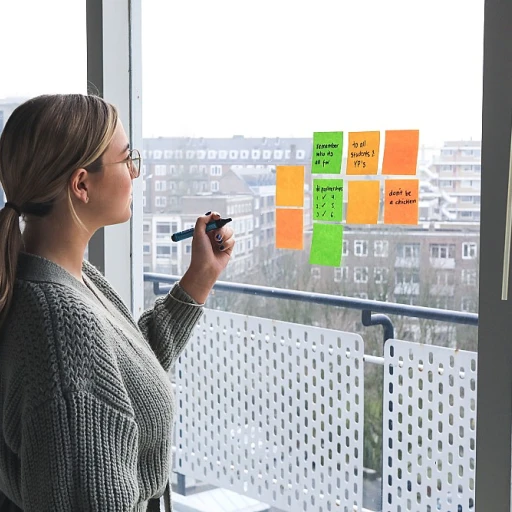Understanding the Role of a Workplace Experience Coordinator
The Essential Role of a Workplace Experience Coordinator
In today's dynamic office environments, the role of a Workplace Experience Coordinator is becoming increasingly vital. These professionals are tasked with creating an engaging and efficient workplace that not only meets the needs of the company but also enhances the overall employee experience. This role is not just about managing office logistics; it involves a strategic approach to fostering a positive work environment.
Key Responsibilities and Skills
A Workplace Experience Coordinator works closely with experience managers and other executive roles to ensure that the office functions smoothly. This includes everything from managing office services to organizing events that boost morale and productivity. The job description often highlights the need for strong organizational skills, creativity, and a knack for problem-solving.
- Coordinating office activities and events
- Ensuring compliance with the company's privacy policy and other regulations
- Supporting management in creating a cohesive work environment
- Collaborating with business partners to enhance workplace strategies
Why This Role Matters
With the rise of remote work and flexible office arrangements, the role of a Workplace Experience Coordinator has evolved significantly. They are not only responsible for maintaining the physical space but also for integrating technology to support remote and hybrid work models. As early applicants for such coordinator jobs in places like San Francisco and the Bay Area have discovered, this position requires a proactive approach to adapting to new challenges.
Ultimately, the goal is to create a workplace that attracts and retains top talent, ensuring that employees feel valued and engaged. This aligns closely with improving employee satisfaction and retention, which we'll explore further in subsequent sections.
Navigating Unique Challenges in UK Companies
Unique Challenges in the UK Workplace
Navigating the intricacies of the contemporary UK workplace environment can pose significant challenges for companies looking to enhance their office dynamics. A Workplace Experience Coordinator plays a crucial role in overcoming these hurdles. UK companies face distinct challenges, given the different regional regulations, cultural nuances, and rapidly changing job market dynamics.- Regulatory Environment: The UK has an intricate web of labour laws and privacy policies that must be navigated, making the role of experience managers pivotal to ensure compliance. They work closely with business partners to align the workplace strategies with legal requirements.
- Cultural Diversity: The diversity across the various regions of the UK necessitates tailored approaches to address employee experience. Experience coordinators actively engage with employees from different backgrounds to foster inclusivity.
- Technological Integration: With the rise of remote and hybrid working models, integrating technology seamlessly into office operations is vital. Experience managers in the UK are tasked with implementing tech solutions that support both physical and remote work environments.
- Job Market Dynamics: The contemporary job market requires companies to be agile in their hiring processes. With roles ranging from executive assistants to office coordinators, businesses need to remain competitive in attracting talent. Experience coordinators are often involved in crafting appealing job descriptions and enhancing the overall employer brand.
- Employee Retention: Retaining top talent in a competitive market is challenging. By improving employee satisfaction and engagement, experience managers contribute significantly to lowering turnover rates.
Improving Employee Satisfaction and Retention
Elevating Employee Engagement and Retention
In today’s competitive business landscape, retaining top talent is crucial. The role of a Workplace Experience Coordinator is integral to boosting employee satisfaction and retention. When companies in the UK focus on improving the overall workplace experience, they not only create a more attractive job environment but also foster loyalty and commitment among their workforce. Engagement is a key component of employee satisfaction. Experience managers can actively curate events, workshops, and team-building activities that encourage collaboration and a sense of community. This often translates to a higher retention rate, as employees feel their well-being and professional growth are prioritized. A Workplace Experience Coordinator’s job is multifaceted. By listening to early applicant feedback or comments from existing employees, they can tailor experiences that align with the aspirations and needs of the office team. Personalized initiatives, like mentorship programs or leadership boards, contribute significantly to an employee’s sense of belonging and career development. Moreover, office coordinators should work closely with human resources and senior management to align workplace experiences with overall business goals. For instance, a collaborative effort between the experience coordinator, HR business partners, and the vice president of operations can create targeted strategies that address departmental challenges unique to UK companies. In addition to personal engagement, the management and enhancement of the physical surroundings also play a part in employee retention. The experience coordinator role involves ensuring that the office space is both enjoyable and conducive to productive work. This might involve using ergonomic furniture, innovative workspace designs, or maintaining a clean and organized environment, thus reducing stress and increasing job satisfaction. For UK companies looking to actively revitalize their retention strategies, regular evaluations and updates to the workplace experience are necessary. Insight into the effectiveness of these strategies can be gained by viewing the results of employee satisfaction surveys, exit interviews, and productivity metrics. For more insights into making your work environment more appealing and efficient, consider exploring career opportunities with Sampoerna, which discuss the importance of an engaging workplace. By leveraging these resources, companies can make informed decisions that boost employee longevity and happiness in the office.Integrating Technology for a Better Workplace Experience
Integrating Advanced Tools for Optimal Performance
Integrating technology within the workplace has become an essential element for enhancing the office experience. The role of a workplace experience coordinator has evolved to actively incorporate technological solutions to improve the overall environment, streamline processes, and support employee satisfaction. This approach aligns with the goals of improving employee retention and satisfaction through innovative solutions. A crucial aspect involves identifying suitable tools that align with the company's operations and employee needs. Experience managers now focus on making informed decisions about which software and devices to integrate. For example, adopting a modern office management system can simplify tasks for both executive assistants and entry-level positions such as an office coordinator, by automating routine work and freeing up time for more critical functions.Technological Innovations Encouraging Collaboration
Today's workplace experience thrives on seamless collaboration powered by technology. Experience coordinators scout for cutting-edge collaborative platforms that bridge distances, whether teams are based in London or San Francisco. The emerging trend of technology-driven collaboration enhances communication and workplace dynamics, sometimes making geographic boundaries irrelevant. Furthermore, data analytics tools play a pivotal part in understanding employee interactions and preferences. These insights help managers and experience coordinators to tailor experiences, ensuring an efficient integration of technology that supports both personal and organizational goals.Technology-Driven Employee Engagement
Modern technology can also personalize employee experiences. Experience managers utilize platforms that offer personalized views on company performance, hierarchy, and progress. Such tools not only engage employees but also provide essential insights for experience coordinators to refine strategies and improve job satisfaction. For instance, integrated platforms can streamline application processes, making it easy to apply for internal job postings. This not only makes opportunities more accessible to early applicants but also supports career growth within the company, reinforcing a positive work culture. Incorporating technology into workplace dynamics is not just about efficiency—it fosters an open, engaging, and dynamic environment that keeps pace with industry trends. By strategically leveraging technological advancements, workplaces can create an environment that is collaborative and innovative, ultimately enhancing employee experience and satisfaction.Fostering a Collaborative Office Culture
Creating a Collaborative Environment
Fostering a collaborative office culture is essential for improving the workplace experience. An experience coordinator plays a crucial role in this by facilitating communication and teamwork. By actively engaging with employees and management, they ensure that everyone is on the same page, which is vital for achieving business goals.
Encouraging Open Communication
Open communication is key to a successful workplace. Experience managers and coordinators can set the tone by organizing regular meetings and feedback sessions. These gatherings provide an opportunity for employees to voice their opinions and for management to share updates. This approach not only improves transparency but also builds trust within the team.
Facilitating Team-Building Activities
Team-building activities are another effective way to enhance collaboration. Whether it's a workshop in the office or an off-site retreat in the bay area, these activities help break down barriers between departments and encourage a sense of unity. Experience coordinators can tailor these events to meet the specific needs of their teams, ensuring maximum engagement and benefit.
Leveraging Technology for Collaboration
Incorporating technology is essential for modern collaboration. Tools like project management software and communication platforms can streamline workflows and keep everyone connected, regardless of location. Experience coordinators can work with IT services to implement these tools effectively, ensuring they align with the company's privacy policy and enhance the overall employee experience.
By focusing on these areas, a workplace experience coordinator can significantly improve the dynamics within a company, leading to better job satisfaction and retention.
Measuring Success: Key Metrics for Workplace Experience
Key Performance Indicators for Improved Office Dynamics
Measuring success in enhancing the office dynamics through the role of a Workplace Experience Coordinator requires a strategic approach. Companies in the UK need to focus on specific key performance indicators (KPIs) to assess the effectiveness of initiatives aimed at fostering a collaborative office culture and improving employee satisfaction.- Employee Satisfaction Surveys: Conducting regular surveys to gauge employee morale and satisfaction can provide tangible evidence of the workplace's health. Tracking changes in survey results over time can help identify areas for improvement and celebrate successes in workplace experience initiatives.
- Retention Rates: A critical metric for assessing the impact of enhanced office dynamics is employee retention. By comparing current retention rates to past figures, businesses can evaluate the efficacy of hiring practices, job satisfaction, and overall workplace experience. Reduced turnover often indicates a more fulfilling work environment, aligning with efforts to improve office dynamics.
- Productivity Metrics: Monitoring employee productivity can highlight the efficiency of the office environment. Tools and solutions adopted, such as integrating technology, can play a significant role in streamlining processes and boosting productivity.
- Engagement Levels: Engaged employees are more likely to contribute positively to the workplace culture. Tracking participation in company events, trainings, or feedback sessions can provide insights into the levels of employee engagement.
- Use of Office Amenities: The coordinator's role often includes optimizing the use of office amenities. By tracking which amenities are most utilized and by whom, businesses can better understand their employees' preferences and make data-driven decisions for future resource allocation.
- Workplace Environment Improvement: Another key metric is evaluating the physical and environmental changes within the office. This could include assessing improvements in air quality, lighting, or ergonomic furniture, all of which contribute directly to employee well-being and productivity.













